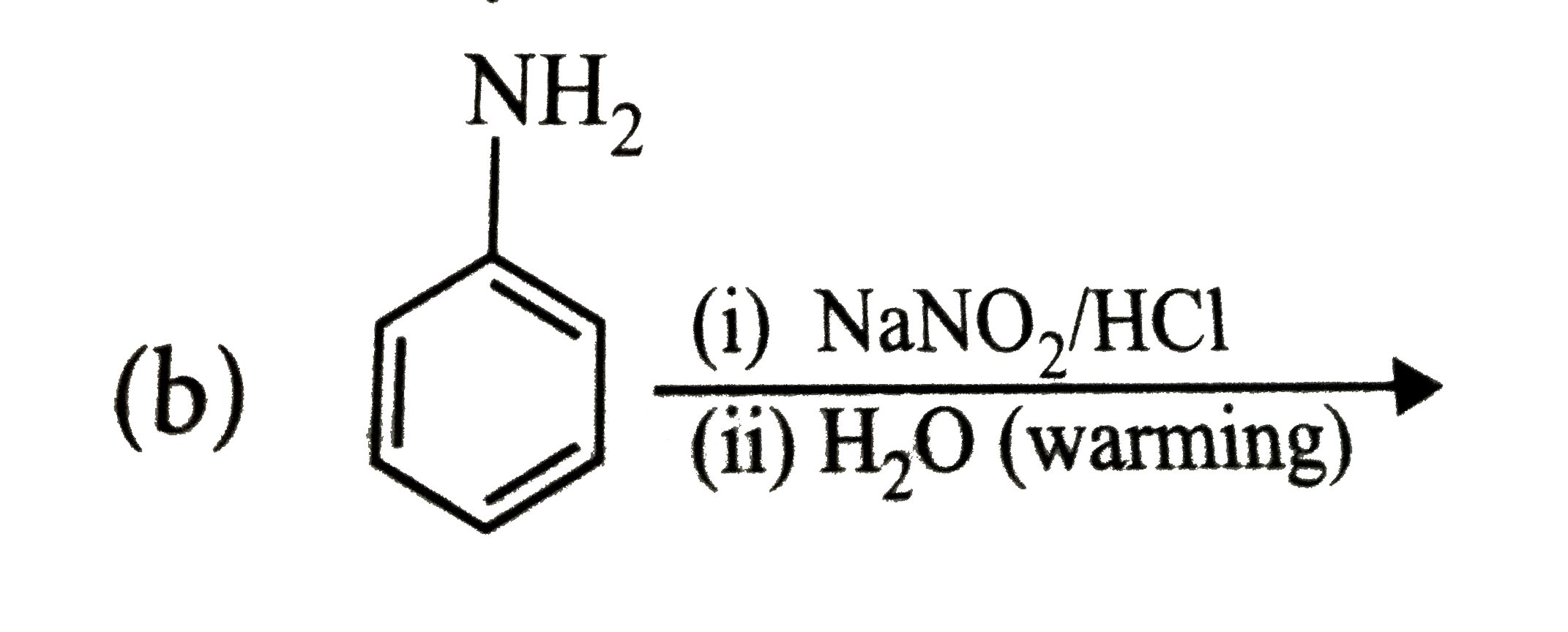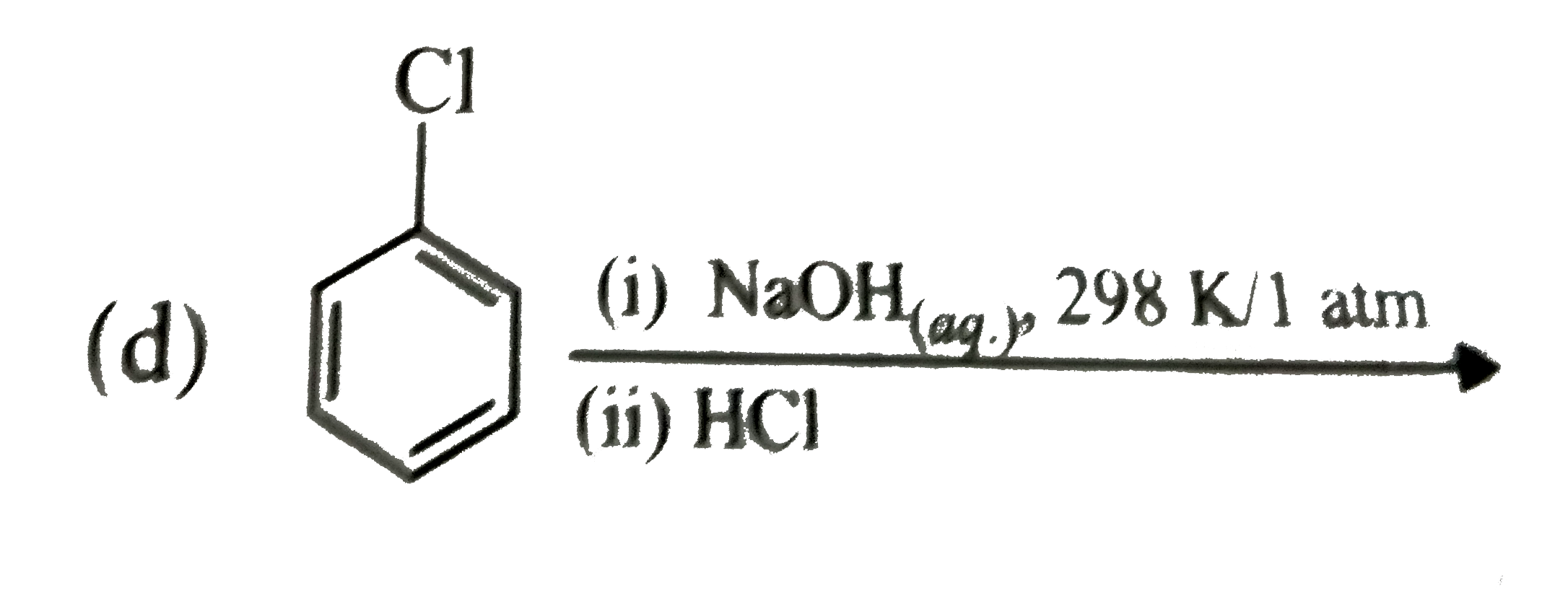Which of the following acids will give maximum yield of alkyl chloride in Huns diecker reaction
CH3−CH2−CH2−COOH
CH3−CH∣CH3−COOH
CH3−CH3∣C∣CH3−COOH
C6H5−CH∣CH3−COOH
The correct Answer is:A
To determine which acid will give the maximum yield of alkyl chloride in the Hunsdiecker reaction, we need to analyze the reaction mechanism and the stability of the free radicals involved.
1. Understanding the Hunsdiecker Reaction:
The Hunsdiecker reaction involves the conversion of silver salts of carboxylic acids to alkyl halides (in this case, alkyl chlorides) using halogens (like Br2) in the presence of a solvent such as CCl4. The general reaction can be represented as:
RCOOAg+Br2CCl4−−−→RBr+CO2+AgBr
Here, R represents the alkyl group derived from the carboxylic acid.
2. Identifying the Free Radical Formation:
The reaction proceeds through a free radical mechanism. The key step is the formation of the free radical from the carboxylic acid. The stability of the free radical formed will influence the yield of the alkyl halide.
3. Stability of Free Radicals:
Free radicals can be classified based on their degree of substitution:
- Primary (1°) free radicals: Less stable but more reactive.
- Secondary (2°) free radicals: More stable than primary but less reactive.
- Tertiary (3°) free radicals: Most stable but less reactive compared to primary radicals.
The reactivity order of free radicals is: 1° > 2° > 3°.
4. Analyzing the Given Options:
Let's assume we have different carboxylic acids as options:
- Option 1: A primary carboxylic acid (forms a 1° free radical).
- Option 2: A secondary carboxylic acid (forms a 2° free radical).
- Option 3: A tertiary carboxylic acid (forms a 3° free radical).
- Option 4: Another primary or secondary carboxylic acid.
Since primary free radicals are more reactive, the acid that forms a primary free radical will yield the maximum alkyl chloride.
5. Conclusion:
Based on the analysis, the acid that produces a primary free radical (Option 1) will give the maximum yield of alkyl chloride in the Hunsdiecker reaction. Therefore, the correct answer is:
Option 1
The Hunsdiecker reaction involves the conversion of silver salts of carboxylic acids to alkyl halides (in this case, alkyl chlorides) using halogens (like Br2) in the presence of a solvent such as CCl4. The general reaction can be represented as:
RCOOAg+Br2CCl4−−−→RBr+CO2+AgBr
Here, R represents the alkyl group derived from the carboxylic acid.
The reaction proceeds through a free radical mechanism. The key step is the formation of the free radical from the carboxylic acid. The stability of the free radical formed will influence the yield of the alkyl halide.
Free radicals can be classified based on their degree of substitution:
- Primary (1°) free radicals: Less stable but more reactive.
- Secondary (2°) free radicals: More stable than primary but less reactive.
- Tertiary (3°) free radicals: Most stable but less reactive compared to primary radicals.
Let's assume we have different carboxylic acids as options:
- Option 1: A primary carboxylic acid (forms a 1° free radical).
- Option 2: A secondary carboxylic acid (forms a 2° free radical).
- Option 3: A tertiary carboxylic acid (forms a 3° free radical).
- Option 4: Another primary or secondary carboxylic acid.
Based on the analysis, the acid that produces a primary free radical (Option 1) will give the maximum yield of alkyl chloride in the Hunsdiecker reaction. Therefore, the correct answer is:
Option 1
Similar Questions
Knowledge Check
Consider the given reaction, RCOOAgBr2/Δ−−−−−−→CCl4R−Br
Which one of the following acids will give maximum yield of R-Br in the above reaction?A B
B C
C DAll will give same yield
DAll will give same yieldWhich of the following reactions will not yield phenol ?
A B
B C
C D
D
Which of the following alcohols will yield the corresponding alkyl chloride on reaction with concentrated HCl at room temperature?
ACH3CH2−CH2−OHBCH3CH2−C∣CH3H−CH2OHCCH3CH2−C∣CH3H−CH2OHDCH3CH2−CH3∣C∣CH3−OH
Which of the following reactions will yield phenol ?
View SolutionWhich of the following reactions would give caproic acid ?
View SolutionWhich of the following yield maximum energy
View SolutionWhich of the following will not give positive chromyl chloride test ?
View SolutionWhich of the following alcohols will yield the corresponding alkyl chloride on reaction with concentrated HCl at room temperature ?
Thinking process
To solve this problem, students keep in mind that tertiary alcohol being most reactive react at room temperature.
View Solution
